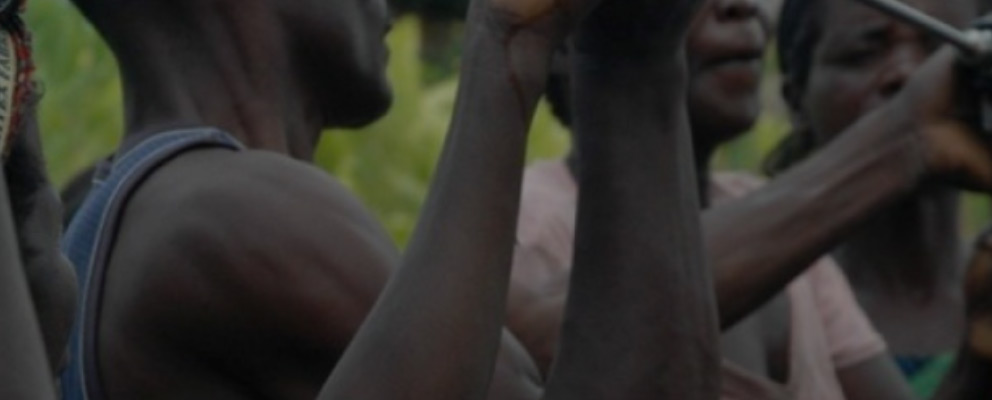
Doing Well by Doing Good
In the grand staircase of the cSpace King Edward, an innovation hub and collaborative working space in Calgary, there is a massive multicolor bouquet of bizarre flowers growing out of the concrete corner. It’s a great allegory for the renewal needed in our economies, locally and globally - the evolution and new growth supported by solid, long-lasting structures.
We recently gathered friends of EWB, the A100, the DKM Foundation and Innovate Calgary on the top floor of the cSpace, for a night of discussion on the theme of “Doing Well by Doing Good” and the renewal of our economies. The panel brought together myself, Boris Martin, CEO of EWB, Evan Hu, serial entrepreneur, investor and Chair of Calgary Technologies Inc, and Cynthia van Sundert, Executive Director of The A100. If you missed it, I’m sorry. It was fun, the food was tasty, the wine was free, the company was excellent, the view was stunning. We’ll do it again, I promise, and you may be invited if you finish reading this blog post!*
The whole evening was an unlikely encounter. Evan and Cynthia have experience fostering economic renewal in Calgary, and I have the same but in sub-Saharan Africa. What brought us together is one shared belief and one shared reality.
One shared belief: that entrepreneurs have a lot to offer when it comes to improving the well-being of our communities. In Calgary, the tech entrepreneurship ecosystem offers hope for a diversified economic future- one that sees more families with stable jobs, less vulnerable to the ups and downs of a few dominant sectors.
“Alberta has a wonderful growing entrepreneurial ecosystem filled with driven entrepreneurs, but there are still a few things that are important to develop, like our tech talent, venture capital, and global profile,” says van Sundert. “We are beginning to create new ventures but we also need to help existing startups to scale and make strides. It is now time to step on the gas and grow globally scalable tech companies.”
In Africa, tech entrepreneurs offer the hope of answering the basic needs – such as improved education, food production, shelter, and energy – of people living in poverty, at scale. Entrepreneurship is different from traditional charity in that it can deliver exponential change, and has a resource engine built in – it keeps on going, even when subsidies are gone.
GreenPath Food, for example, is an Ethiopian startup and EWB-supported venture that sources high-quality produce from smallholder farmers and sells the produce to international buyers. By doing so, GreenPath removes barriers that are preventing the country’s millions of smallholder farmers from accessing premium global markets. Through its social enterprise model, GreenPath has been able to increase their partners’ incomes by up to 10x and help to make smallholders farming operations more environmentally and economically sustainable. The company just raised it’s Series A investment, enabling it to grow its current operations and expand to new sites in Ethiopia and improve the livelihoods of even more farmers and their families.
One shared reality: that emerging technologies like Artificial Intelligence, the Internet of Things, Big Data, Mobile based financial services, and virtual currencies are offering radically new possibilities that were unimaginable just 10 years ago. This revolution is touching everyone’s lives, whether you were born in Nairobi or Calgary, Accra or Toronto. Today, exponential technologies make it possible to solve entrenched problems at scale.
Regardless of the city and the continent, it matters who gets to be an entrepreneur. The panel highlighted how, in all geographies, it is often entrepreneurs who have themselves lived in situations of inequality and exclusion who, from their lived experience, are driven to build sustainable and inclusive companies. Yet, in all cities, those are also often the ones being overlooked by traditional investors.
Maybe, just maybe, this technological revolution makes it such that Africa and Canada aren’t as different as they seem. When it comes to reinventing our economies, our futures are bound together. Maybe it’s time we start innovating together.
*If you’re interested in our future events, subscribe to our email updates!
Want to keep the conversation going? Connect with our “Doing Well by Doing Good” panelists on Twitter!
Cynthia Van Sundert – Cynthia is currently the Executive Director of the A100, Alberta’s community of seasoned technology founders and executives. Cynthia has spent her career in not-for-profit ecosystems combining a passion for what’s new and innovative with a love of the arts and a desire to give back to the greater community. Her broad experience spans the symphonic arts (Montreal Symphony Orchestra and Calgary Philharmonic Orchestra), the TMX (Montreal Exchange), and the startup entrepreneurial community (CTI, Tynt, Chaordix, Kudos), making her versatile with a high capacity to adapt to complex environment and industries.
Evan Hu – Evan is a serial entrepreneur and executive coach. He was the founder of multiple successful startups including OmniLogic, MapleMusic and Ideaca. A Rainforest AB fellow and a member of the A100 and Engineering Change Lab, he is active in the Canadian startup community as an angel investor, educator and volunteer. He is the Chair of Calgary Technologies Inc and is a Founding Partner and G7 Associate at Creative Destruction Lab.
Boris Martin – Boris is CEO of Engineers Without Borders Canada. EWB’s mission is to bring people and ideas together to tackle the most crucial causes of poverty and inequality. The organization invests in and supports social enterprises that harness the power of emerging technologies, innovative business models, social innovation and social justice know-how to drive lasting, transformational impact within communities that need it most. EWB has also grown into a global community of young, systemically-minded leaders in Canada and abroad, supporting innovators and advocating for policies that address the root causes of poverty and inequality.
